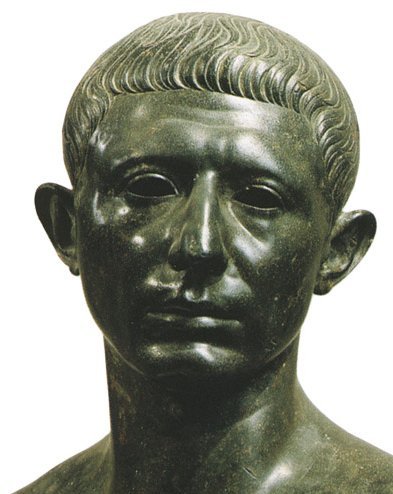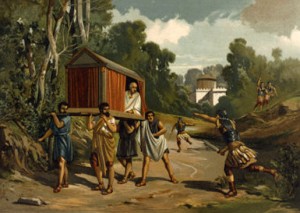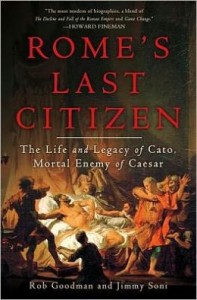Hi all, I’ve kinda been thinking lately about how so many that mattered in the generation of senators who replaced the initial cabal of senior statesman dominant in Roman politics upon Sulla’s death (eg. Catulus, Hortensius, Lucullus etc) regardless of faction had a Sullan defiance story. Pompey, Cicero, Caesar and Cato all had such a story. Sort of like the Bolsheviks and the October revolution or the generation of Brits who fought in the first world war or (in some ways closer to the mark) Germans and the third Reich. Roman politicians, in particular those old enough to have been viewed as adults at the time of Sulla’s dictatorship but not senior enough to have been considered politically significant (the glaring exception there is Pompey who achieved great political significance at a very young age) asked each other where were you and what did you do when Sulla came to town. Seemingly everyone had to have a story that in many cases would form an integral part of the construction of their public Persona, It was clearly important to be seen to have in some way stood up to the dictator, similarly implication in the perceived excesses of the Sullan regime became the starting point for Character assassinations (see Catilina and Crassus (both enemies of Cicero who thus get their reputations blackened) and to an extent also Pompey).
So now let’s (crudely, oh so very crudely) relate and compare these stories in regards to their likelihood and impressiveness, by which I mean how much bravery they would have taken. Of All these stories Cicero’s is in many ways the least direct as it consisted of his defending a client of his (Sextus Roscius) on a charge of murder in court in one of Cicero’s first great cases, he did this by turning the trial into an attack on the corruption of Chrysogonus, Sulla’s freedmen who was overseeing the administration of much of the proscriptions in doing so Cicero was at least implicitly criticizing Sulla’s regime publicly, before a large crowd in the Roman forum itself. However Cicero went to pains to make it plain that he was not criticizing Sulla himself, even praising the man, laying all the excesses in question at the foot of a few corrupt individuals. As such Sulla was able to scapegoat Chrysogonus as he may have already intended (or not, either way) and Cicero a nobody with no army was clearly little threat. In terms of reliability though the speech handed down to us of the trial by Cicero has likely been slightly revised by him after the fact, this was a well known public event and if Cicero had not in fact said something like what is recorded his enemies (in which he was seldom deficient) would have exposed it easily, the gist of this Sullan defiance story is thus in my view highly reliable, this one happened ladies and gentlemen. Oh and he won the case btw.
Now to Pompey whose defiance story is as brazen, direct and impudent as they come, but that’s Pompey for you (another reason these stories likely survived is that they were likely reflected the public perception of these historical personages as well as helping to create it in a sort of cyclical effect), Firstly according to Plutarch after Pompey had defeated the Marian/Cinnan/Carbo (rapid turnover of leadership among the faction, I don’t even think Carbo was the leader any more by the time of Pompey’s victory in Africa) faction in Africa Sulla commanded him to dismiss most of his legions and await replacement as governor, instead Pompey’s army mutinied and returned to Rome, Pompey claimed (and Plutarch believes him, more fool him) that he the mutiny was against his wishes and he tried to stop it, and if you believe this of Pompey I have a house I’d like to sell you…..nevertheless Sulla backed down and welcomed Pompey back, Pompey then demanded a triumph, Sulla refused to grant it to him in the words of Plutarch “intimating that he could not by any means yield to his request, but if he would persist in his ambition, that he was resolved to interpose his power to humble him” to which Pompey replied that “More people worship the rising than the setting sun” implying that while his own power was rising that Sulla’s was waning, or to point out the sheer impudence, gall and hubris of such a statement: “it’s my time old man, you’ve had yours, get out of my way”. Seemingly stunned by the sheer gall of this Sulla backed down immediately exclaiming “let him triumph”.
As to the reliability of the above, the mutiny and march on Rome could hardly be a made up anecedote (“Yo remember when Pompey’s army marched on Rome in defiance of Sulla”, “hang on when did that happen”, you get the point, this isn’t the kind of thing that turns out to be an after the fact myth) so the earlier parts definitely solid, except in regards to Pompey’s motivations and role in the ‘mutiny’ to which I feel as evidenced by Pompey’s record for egotisim and treachery I must say liar! liar! Toga on fire! As to the stuff about the triumph, well we know Pompey triumphed for his campaign in Africa and as to the famous exchange Plutarch makes it clear that others were present but he gives no detail as to who those others were, this part is more likely to be apocryphal but still unlikely to be, both Pompey and especially Sulla were important people at the time, at the heart of Public life as such if this were in some way a public exchange (even if just among Rome’s elite) there are important people who would have known about it. As to the impressiveness of the defiance we have already mentioned it’s brazenness and audacity but it should always be remembered that unlike any of the others I’m covering he had a personal army to back him up. People with their own armies tend to get a bit of leeway with the boss, keep that in mind while angling for your next promotion.
Next up is Caesar, Now Caesar was a bit younger than Cicero and Pompey and held (or was scheduled to hold) a priesthood -the Flamen Dialis, that was really restrictive in its rules as well (for instance the Flamen Dialis could not have contact with iron, ride a horse or go far from the city and thus obviously could not lead an army or have much of a chance at a significant political career, at some point Sulla removed his priesthood carving the way ironically considering what I am about to convey for Caesar’s brilliant future politico/military career) and thus had not really entered public life, his family was patrician but was not prominent among Rome’s senatorial families and until recently had been outright obscure and for someone of a senatorial family the young Caesar was outright poor. He was however Marius nephew by marriage and married to Cinna’s daughter. In Sullan Rome this was a problem, Sulla demanded that Caesar divorce his wife, Caesar refused, indeed according to my plutarch (Plutarch doesn’t connect this explicitly with Sulla’s demand for Caesar’s divorce but it is normally associated with it and as we have no other accounts of a disagreement between the two aside from a confused reference to a priesthood by Plutarch that is likely a mistake for something else….) Sulla threatened him with his power to which Caesar answered him with a smile, “You do well to call it your own, as you bought it.” referring to allegations that Sulla won election to the office of Praetor through bribery. As a consequence of his defiance Caesar’s property was seized and a price put on his head, he went into hiding, supposedly having to bribe a soldier who captured him after he caught Malaria. Fortunately for Caesar his family also had connections with Sulla and pressured him to pardon the boy, Caesar was no threat and his connections to Sulla’s enemies old and made as a child, with Cinna long dead Caesar’s marriage to his daughter did not mean that much in practical terms.
This is one impressive story a young political nobody with no private army defying the dictator to his face and seemingly even calmly insulting him when subsequently threatened, this is in my opinion the most impressive of all the stories and it is important to note that of the four men discussed here he was the only one who was actually proscribed (this time around Cicero turn would come……), even if it was later revoked, that has got to win you some serious street cred. What’s more is that just like the preceding 2 tales it’s even likely to be true. Proscriptions and appeals would have been matters of public record and knowledge, the social world that Sulla, Caesar and Caesar’s relatives lived in was such that if a young patrician (the son-in-law of the late Cinna no less) was proscribed then pardoned people would know about it, furthermore like Cicero Caesar had many enemies throughout his career and there is a significant anti-Caesarean strain in much literature including much of Cicero’s prolific writings, if this wasn’t true he was unlikely to get away with it. The one aspect of the story on shaky ground is Caesar’s retort to Sulla’s threat, it is not near as well represented in the sources as the actual refusal, threat and flight and smacks more of anecedote, besides unlike the essential facts of the matter who would remember the gritty details of Caesar’s exchange with Sulla well enough to be able to deny a zinger. It could still easily be true however.


Finally we come to Cato Uticenses or Cato the Younger (we are just going to call him Cato), with his reputation as a particularly stubborn arch-conservative Cato is often depicted in film and popular culture as older than he actually was. For example in the novel series “emperor” Cato is portrayed as much older than Caesar (as well as a fat hedonistic amoral Machiavellian senior Sullan who dies during the Spartacus rebellion………I don’t know where to start………) in HBO”s Rome he is played by an actor who looks older than the guy they got for Pompey, much less Caesar and the same is the case for the 2002 mini-series called Julius Caesar where Christopher Walken plays Cato as a senator of long standing at the time of Sulla’s takeover of Rome and decades older than Caesar and again significantly older than Pompey (Richard Harris, the first Dumbledore, played Sulla in one of his last performances….so there’s a contrast…….). In reality Cato was the youngest of the four and unfortunately for him seemingly on the very edge of this generation, old enough to be expected to have such a story perhaps but not old enough to have much of a chance at actually having one, Caesar had not yet begun his public career and Cato was roughly 5 years his junior. His story is that his tutor was wont to take him to Sulla’s house to wait on him (this was possible due to Sulla’s relationship with Cato’s family) in order for him and the boy to attain favour, Cato seeing the excesses of The Sullan regime up close and sensing the terror of those around him enquired of his tutor “Why does nobody kill this man?” his tutor replied that it was because they feared him more than they hated him, “why then” inquired Cato “did you not give me a sword, that I might stab him, and free my country from this slavery?” and afterwards seeing that he meant it his tutor kept a closer eye on him.
Well doesn’t that sound bold?! None of the previous stories go as far as muting a likely suicidal assassination attempt! and all this from a teenage boy!…………it does indeed SOUND bold but I just highlighted the key word for you in that statement, sound. All the other stories mentioned include some ACTUAL defiance of Sulla (Pompey, Caesar) or at the very least open criticism of his regime (Cicero), the declaration is audacious but it is made in anger to his tutor, not to a crowd, not to other members of the Senatorial class and certainly not to Sulla and as to actions well let’s just say he obviously never got that sword (Cato must decided to put off the whole martyrdom thing till a more futile time after he’d achieved his professional goal of starting a Civil war). We’ve all said some pretty daring things (especially when very young) when no-one, only close friends or someone less important than us is around.
As to it’s reliability well for the reasons given in the previous paragraph this story is extremely unreliable too, there are no reliable witnesses, just Cato and his tutor, a socially inferior employee of his family. What’s more it’s case as something impressive is based entirely on Cato’s tutor (Sarpedon) believing according to Plutarch that he’d do it too, that’s a few too many degree’s of separation for my liking all other stories mentioned involved something notably more public or at least involved witnesses of equal or greater standing to the putative politician in question. Incidentally this isn’t even supposed to be Cato’s first defiance of a powerful figure, Plutarch (who else?) records that he stood up to the threats of Poppaedius Silo a leader of the Socii people the Marsi (Italian allies of Rome) who had playfully asked the children of Drusus’s household (where Cato grew up) to support him and Drusus in their bid to gain the Roman citizenship for the Italian allies. As this soon happened (after a war, thanks to people who shared Cato’s attitude) It seems even as a small child Cato was determined to stubbornly back history’s losing sides.

In conclusion I think I’ve shed a little light on Sulla’s effect on what Erich Gruen dubbed “the last generation of the Roman Republic” and shown how for

politicians of this generation your perceived actions during the dictatorship and terror of Lucius Cornelius Sulla formed an integral part of your origin story, for better or worse. Indeed this seems to have been so Important that Cato or those who supported or sympathized with him felt the need to claim that a very young Cato would have killed the Dictator for being a tyrant………if his tutor hadn’t stopped him….., in other words it was inconceivable to those who saw Cato as the greatest defender of the Republic’s narrow conception of liberty of his generation that he had had not in some way stood up to Sulla and so he or those who sought to believe in him clutched at/constructed rumors. In light of the less dubious and arguably more impressive defiance of all the others mentioned for someone whose authority was heavily reliant on moral pre-eminence by comparison to his rivals (Pompey the absurdly rich accomplished general and administrator, Cicero the extremely talented lawyer and orator and Caesar, Cato’s great enemy, who was not only a great orator, politician, administrator and general but also had the most impressive Sulla defiance story) this was especially important as Cato had no great conquests to his name, no brilliant reputation in the courts and never even reached the consulship too bad he or some supporter had to lie to give it to him. Finally it is interesting to note that despite continued political instability, violence and outright civil war it is only with the emergence of a new and younger generation who were outright children or (In Octavian’s case) not even born at the time of Sulla’s proscriptions that the ugly practice returns, it is in a strange and morbid way fitting that the last survivor of these four dictator defiers died as a result of these second proscriptions and that though they survived Sulla none died of natural causes make of that what you will.
By the way I don’t much care for Cato, thought you should know.
Regards,Samuel ‘I said someone should kill Robert Mugabe once, where’s my medal’ Runge.
